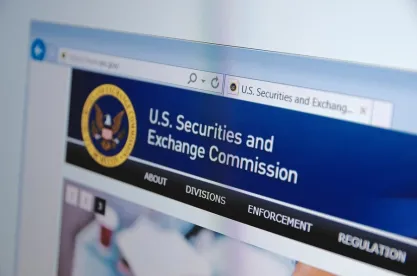On August 26, 2020, the U.S. Securities and Exchange Commission (SEC) adopted final rules to amend the definition of “accredited investor” in Rule 501(a) under the Securities Act of 1933 (Securities Act) to add new categories of qualifying natural persons and entities and make certain other modifications to the existing definition. Qualification as an “accredited investor” is a typical requirement to participate in unregistered, exempt securities offerings.
According to the SEC, in 2019 there was approximately $1.2 trillion (30.8 percent) raised in registered offerings, compared to approximately $2.7 trillion (69.2 percent) raised through unregistered, exempt offerings (including approximately $1.56 trillion raised in offerings under Rule 506(b) and Rule 506(c) of Regulation D promulgated under the Securities Act). Unregistered private offerings are effected through exemptions and safe harbors from registration under the Securities Act and do not have the rigorous disclosure and procedural requirements, and related investor protections, that are provided to investors in registered offerings. As a result, the SEC has promulgated rules that essentially limit participation in unregistered private offerings (primarily offerings pursuant to Rule 506(b) and Rule 506(c) of Regulation D) to “accredited investors.” [1]
Prior to the adoption of the new amendments, the test for qualification as an “accredited investor” relied exclusively on either a person’s income or net worth. Instead of continuing to use wealth as the sole means of establishing financial sophistication, the SEC's amendments to the definition are intended to identify more effectively those investors with reliable alternative indicators of financial sophistication, such as having sufficient knowledge and expertise to participate in unregistered private offerings.
New Categories of Accredited Investors
The amendments add the following to the definition of “accredited investor”:
-
natural persons holding in good standing one or more professional certifications or designations or other credentials from an accredited educational institution that the SEC has designated as qualifying an individual for accredited investor status. The SEC has designated the General Securities Representative license (Series 7), the Licensed Investment Adviser Representative (Series 65), and the Private Securities Offerings Representative license (Series 82) as the initial qualifying certifications, designations, or credentials;
-
natural persons who are “knowledgeable employees,” as defined in Rule 3c– 5(a)(4) under the Investment Company Act of 1940 (Investment Company Act), of the private-fund issuer of the securities being offered or sold;
-
SEC- and state-registered investment advisers, exempt reporting advisers, and rural business investment companies; [2]
-
limited liability companies with $5 million in assets, not formed for the specific purpose of acquiring the securities being offered; [3]
-
any entities, including Indian tribes, governmental bodies, funds, and entities organized under the laws of foreign countries, not formed for the specific purpose of acquiring the securities offered, owning “investments,” as defined in Rule 2a51-1(b) under the Investment Company Act, in excess of $5 million;
-
“family offices,” as defined in Rule 202(a)(11)(G)-1 under the Investment Advisers Act of 1940 (Advisers Act): (i) with assets under management in excess of $5 million, (ii) that are not formed for the specific purpose of acquiring the securities offered, and (iii) whose prospective investment is directed by a person who has such knowledge and experience in financial and business matters that such family office is capable of evaluating the merits and risks of the prospective investment; and
-
“family clients,” as defined in Rule 202(a)(11)(G)-1 under the Advisers Act, of a family office meeting the requirements in the new rule.
Recognizing “Spousal Equivalent”
In addition, the definition is amended to allow natural persons to include spousal equivalents when determining joint net worth under Rule 501(a)(5), and to include joint income from spousal equivalents when calculating joint income under Rule 501(a)(6). “Spousal equivalent” is defined as a cohabitant occupying a relationship generally equivalent to that of a spouse.
The amendments add a note to Rule 501 to clarify that the securities being purchased by an investor relying on the joint net worth test of Rule 501(a)(5) need not be purchased jointly.
Looking Through Forms of Equity Ownership to Natural Persons
Under Rule 501(a)(8), an entity qualifies as an accredited investor if all of the equity owners of that entity are accredited investors. The amendments add a note to Rule 501(a)(8) to allow looking through various forms of equity ownership to the natural person(s) when determining the accredited investor status of an entity under such rule.
The purpose of this amendment is to clarify that it is appropriate to look through various forms of ownership under Rule 501(a)(8) to natural persons in certain cases in which an equity owner of an entity is itself an entity, but that owner-entity does not qualify on its own merits as an accredited investor (such as an LLC that does not meet the $5 million assets test, but all of its natural-person members are accredited investors).
Effective Date of the Amendments
The amendments will become effective 60 days after publication in the Federal Register.
ENDNOTES
[1] Rule 506(b) of Regulation D does permit sale of securities to a limited number (up to 35) of non-accredited investors in unregistered offerings, provided the issuer delivers information to the investors, which generally contains the same type of information as provided to investors in registered offerings.
[2] Added to the list of entities specified in Rule 501(a)(1).
[3] The amendments clarify that the list of entities specified in Rule 501(a)(3) includes limited liability companies. Prior to the amendments, it has been a longstanding SEC position that limited liability companies satisfying the requirements specified are eligible to qualify as accredited investors under Rule 501(a)(3)




 />i
/>i


